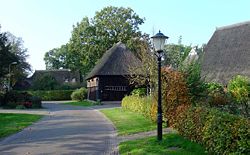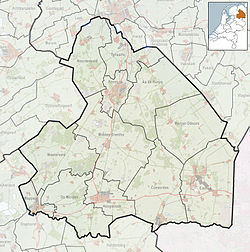Gees | |
|---|---|
 Dorpsgezicht Gees | |
| Coordinates: 52°44′57″N6°41′26″E / 52.74917°N 6.69056°E | |
| Area | |
• Total | 12.72 km2 (4.91 sq mi) |
| Elevation | 16 m (52 ft) |
| Population (2021) [1] | |
• Total | 615 |
| • Density | 48/km2 (130/sq mi) |
| Time zone | UTC+1 (CET) |
| • Summer (DST) | UTC+2 (CEST) |
| Postal code | 7863 [1] |
| Dialing code | 0524 |
Gees is a village in the Netherlands and it is part of the Coevorden municipality in Drenthe.
Gees is an esdorp which developed in the Middle Ages on higher ground. [3] It was first mentioned in 1207 or 1208 as Gies. The etymology is unclear. [4] In 1840, the village was home to 465 people. [5] The first church was built in 1857, [5] and has been replaced in 1913. [3]

